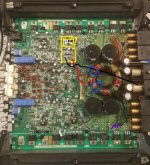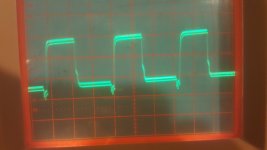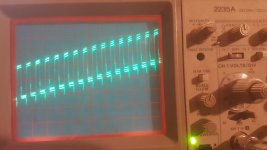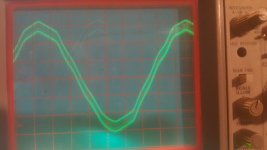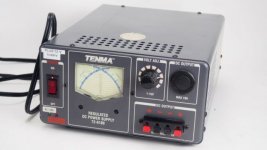Is the head unit's shield ground intact?
What's the resistance between the case of the head unit and the amplifier's primary ground terminal (no RCAs between the amp and head unit)?
What's the resistance between the RCA input shields of the amp and the primary ground terminal on the amp (no RCAs plugged in)?
What's the resistance between the case of the head unit and the amplifier's primary ground terminal (no RCAs between the amp and head unit)?
What's the resistance between the RCA input shields of the amp and the primary ground terminal on the amp (no RCAs plugged in)?
If you actually measured the head unit's shield ground, I don't see a problem that could be creating the noise.
Are you using a switching 12v power supply to power the amp and head unit?
Are you using a switching 12v power supply to power the amp and head unit?
I measured each head unit shield out to the head unit case. Each one read ~0.15 ohms.
Yes, same 12 volt power supply, supplying both amp and head unit. Tenma 72-6180 40 amp supply.
Not sure if I made it clear previously, but the noise is coming from the amplifier itself, with no load. Not through a speaker.
Yes, same 12 volt power supply, supplying both amp and head unit. Tenma 72-6180 40 amp supply.
Not sure if I made it clear previously, but the noise is coming from the amplifier itself, with no load. Not through a speaker.
Is this noise from the amplifier going to be a problem after it's installed in the vehicle?
Did you try moving the windings on the transformer to see if that made a difference?
Did you try moving the windings on the transformer to see if that made a difference?
I'm not sure, it's pretty loud. I haven't decided if I will keep this one or sale it. If I sell it I wanted it to be 100% if possible.
If I touch the windings any where around the transformer the amplitude increases. It's not so much that I am putting pressure on the transformer, just the act of touching it.
If I touch the windings any where around the transformer the amplitude increases. It's not so much that I am putting pressure on the transformer, just the act of touching it.
I will use a scale of 0 to 100 as a reference to describe the amplitude of the humming.
With signal input amplitude is 65.
When I touch the transformer the amplitude increases to 80.
When I move the windings circled in blue it increases and decreases from 80 to 100, commensurate with the movement back and forth.
With my meter probes touching the secondary center tap and the primary ground it decreases from 65 to 50.
If I touch the two primary windings 'purple arrows' with one meter probe and the other probe not touching anything the sound decreases from 65 to 15, barely audible.
Oddly if I touch the drain of the bank of FETs that are connected to these two primary windings or for that matter the third primary winding associated with that bank nothing changes amplitude remains at 65.
Same with any of the other three primary windings going to the other bank of Fets, no change in amplitude, 65.
With signal input amplitude is 65.
When I touch the transformer the amplitude increases to 80.
When I move the windings circled in blue it increases and decreases from 80 to 100, commensurate with the movement back and forth.
With my meter probes touching the secondary center tap and the primary ground it decreases from 65 to 50.
If I touch the two primary windings 'purple arrows' with one meter probe and the other probe not touching anything the sound decreases from 65 to 15, barely audible.
Oddly if I touch the drain of the bank of FETs that are connected to these two primary windings or for that matter the third primary winding associated with that bank nothing changes amplitude remains at 65.
Same with any of the other three primary windings going to the other bank of Fets, no change in amplitude, 65.
Attachments
If you monitor the drive to the FET gates and do what you did above, do you see a rapidly changing pulse width?
The pulse width does not change, but the amplitude of the square wave increases slightly, both in the negative and positive direction when I do something that decreases the humming. i.e. touching a probe to one of the primary windings attached to the FETs as mentioned earlier.
Also in the images 1 and 2 below, the 'fuzzy' part of the top and bottom of the wave do not appear that way when looking at the scope with the naked eye, it was only captured by the camera, which I assume is the amplitude varying rapidly.
The drive signal at the gate is riding on a sinewave as shown in the pictures. These images look the same with and without input signal.
Input supply voltage at 13.4 Vdc
Image 1: 5V/div @ 10us
Image 2: 5V/div @ 50us
Image 3: 20V/div @ 2ms
I also noticed that if I touch anything in the area of the power supply, i.e. filter capacitors, rail capacitors, transformer the amplitude of the humming increases as described in #88.
Also in the images 1 and 2 below, the 'fuzzy' part of the top and bottom of the wave do not appear that way when looking at the scope with the naked eye, it was only captured by the camera, which I assume is the amplitude varying rapidly.
The drive signal at the gate is riding on a sinewave as shown in the pictures. These images look the same with and without input signal.
Input supply voltage at 13.4 Vdc
Image 1: 5V/div @ 10us
Image 2: 5V/div @ 50us
Image 3: 20V/div @ 2ms
I also noticed that if I touch anything in the area of the power supply, i.e. filter capacitors, rail capacitors, transformer the amplitude of the humming increases as described in #88.
Attachments
After looking at image three it is ~128 Vpp and after calculating the frequency, if my calculation is correct, it is 60Hz.
Is this coming from the 12Vdc power supply ?
Is this coming from the 12Vdc power supply ?
It appears that your scope isn't grounded. Connect the scope ground to the amp's primary ground terminal.
You were correct. I have had it 'connected' to the primary ground terminal but it was not making a good connection.🙁
So the drive wave duty cycle does not change while doing anything that changes the humming.
The humming is significantly reduced when touching where the primary windings enter the circuit board at the FETs with anything conductive. Meter probe (with meter off), screwdriver, my finger, etc...
So the drive wave duty cycle does not change while doing anything that changes the humming.
The humming is significantly reduced when touching where the primary windings enter the circuit board at the FETs with anything conductive. Meter probe (with meter off), screwdriver, my finger, etc...
Is your 12v power supply grounded to the mains ground via a 3-prong power plug?
If so, is that ground intact?
If so, is that ground intact?
No, the power plug is 2-prong.
When I bought this amp the previous owner mentioned this hum as being a problem for him also.
The amplifier also had a blown power supply FET on this side of the board and one of the drivers damaged. I have replaced all of the power supply FETs and replaced 2- MMBTA56s (Q2 and Q3).
When I bought this amp the previous owner mentioned this hum as being a problem for him also.
The amplifier also had a blown power supply FET on this side of the board and one of the drivers damaged. I have replaced all of the power supply FETs and replaced 2- MMBTA56s (Q2 and Q3).
To clarify, is the hum a low-frequency hum (like 60Hz from the mains) or is it the high (varying) frequency of the audio file (more of a whine/whistle than a hum) posted?
You gave your power supply make/model but I didn't find much on it. Is that a linear supply or a switching supply?
If this is a high-frequency noise (like the audio file), it's strange to call that a 'hum'. Are you 100% sure that you and he are referring to the same noise/sound?
You gave your power supply make/model but I didn't find much on it. Is that a linear supply or a switching supply?
If this is a high-frequency noise (like the audio file), it's strange to call that a 'hum'. Are you 100% sure that you and he are referring to the same noise/sound?
Yes it is a high-frequency 'squeal','whine/whistle', if you will, that varies proportionally with the audio frequency being input. Especially noticeable, at least to my ears, from 400 Hz to 1700 Hz.
I could not find a manual, but I am guessing a linear supply. It is old and very heavy (large transformer).
I could not find a manual, but I am guessing a linear supply. It is old and very heavy (large transformer).
Attachments
Are you 100% sure that you and he are referring to the same noise/sound?
Was the amp mounted inside the cabin where a relatively low sound/noise could be heard?
Was the amp mounted inside the cabin where a relatively low sound/noise could be heard?
No I am not sure, I can only surmise from his disclosure that it is the same.
I bought it on E.B. and I will include a quote from the sellers email to my question about what was going on with the amp.
"The amp actually outputs audio pretty good, has a high frequency hiss to it but it will output actual audio.
It 100% gets hot enough to burn your skin.
Hopefully that information could help you maybe guess that's to what's going on".
He was referring to the power supply FETs on that bank when saying that they got hot enough to burn you.
I can only assume that he heard this on the bench as he had made a comment that he had tried to repair it, but not sure.
If I were to keep it, it would be installed in the cabin, I don't drive anything with a trunk.
I believe it would be heard in a cabin, my wife could hear it walking by from about 10' away.
I bought it on E.B. and I will include a quote from the sellers email to my question about what was going on with the amp.
"The amp actually outputs audio pretty good, has a high frequency hiss to it but it will output actual audio.
It 100% gets hot enough to burn your skin.
Hopefully that information could help you maybe guess that's to what's going on".
He was referring to the power supply FETs on that bank when saying that they got hot enough to burn you.
I can only assume that he heard this on the bench as he had made a comment that he had tried to repair it, but not sure.
If I were to keep it, it would be installed in the cabin, I don't drive anything with a trunk.
I believe it would be heard in a cabin, my wife could hear it walking by from about 10' away.
- Home
- General Interest
- Car Audio
- Rockford Fosgate Power 400a4
